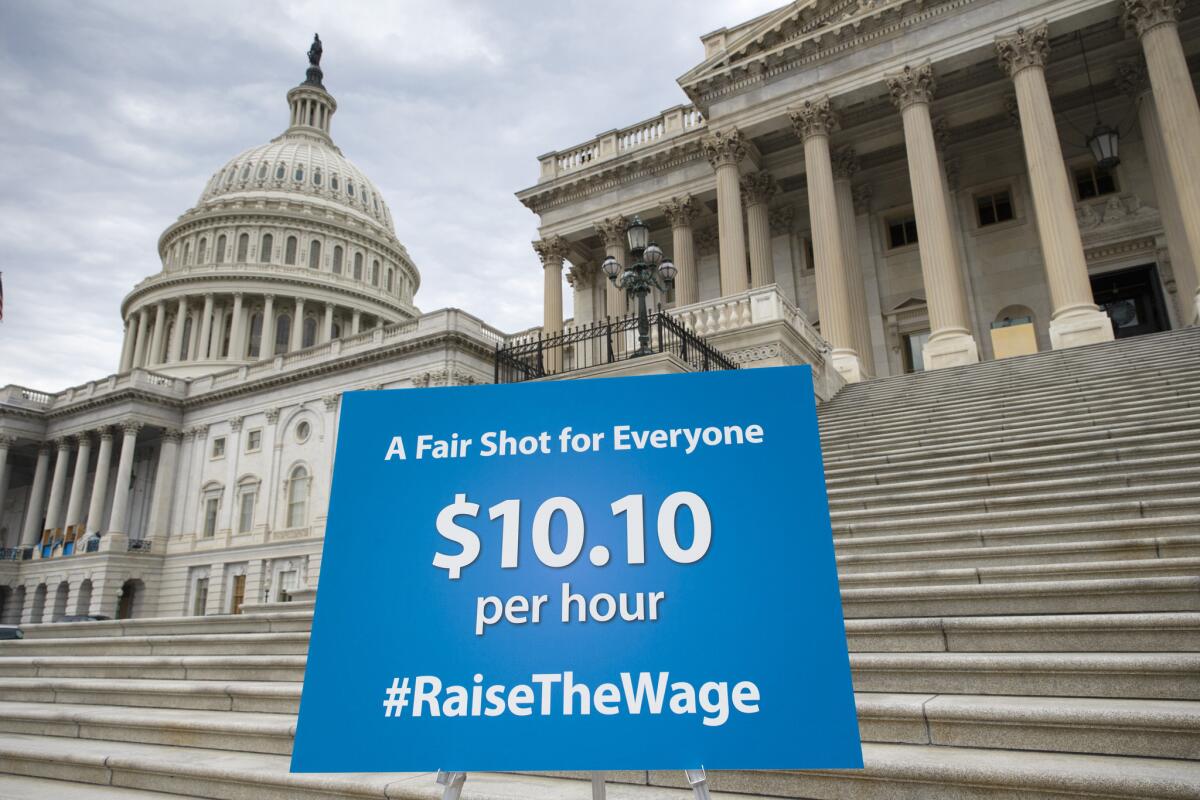Editorial: The minimum wage as a political football

- Share via
This week the Senate is expected to take up President Obama’s proposal to raise the minimum wage, and it has precisely zero chance of becoming law. That’s unfortunate, not only because raising the minimum wage is the right thing to do but because there is mounting support on both sides of the political spectrum for doing so.
The bill in question, S 2223, would raise the minimum wage from $7.25 to $10.10 in three stages over the coming 2 1/2 years. Opponents argue that a higher minimum will lead employers to hire fewer low-wage workers, particularly younger and less experienced ones. But economists have split on this issue, with some finding that the higher wages boost the economy and create jobs. This page supports the increase because it would restore much of the buying power that minimum-wage workers have lost to inflation over the last five decades, despite the occasional adjustment by Congress. At the current level, a full-time worker making the minimum wage doesn’t earn enough to keep a family of two above the federal poverty line. And with productivity gains translating into unusually high corporate profits, now seems like a good time to raise the wage floor.
In fact, some conservatives — most notably Ron Unz — embrace a higher minimum wage as a way to speed up economic growth. So there’s the potential, at least in theory, for a bipartisan approach to this issue. Yet the Senate is poised to take up S 2223 in a way that guarantees the bill will die in a headline-grabbing partisan tussle. Democrats have held no hearings on the bill to build a record for why $10.10 is the right level, why the minimum should apply equally to high schoolers living with their parents and young adults with children of their own, or even why a national minimum wage makes sense when the cost of living varies so dramatically from state to state. Nor have they tried to lay a foundation for adjusting the minimum wage automatically for inflation, as the bill would do, or explored how to do so without fueling an inflationary spiral.
Republicans, meanwhile, have queued up a series of supposedly job-creating amendments that are toxic to at least a majority of the Senate’s Democrats, including one that would approve the Keystone XL pipeline and exempt more employers from the mandate to provide health insurance. And one potential GOP compromise — a proposal by Sen. Susan Collins (R-Maine) for a smaller increase in the minimum wage that would result in fewer job losses — doesn’t seem to have garnered much support on either side of the aisle.
The predictable result is that the Senate will split along party lines, and Democrats will give up on the bill after they fail to cut off a GOP filibuster. The two parties will have what they both seem to want most out of the current congressional session: a campaign issue. And Washington will move no closer to raising the minimum wage.
More to Read
A cure for the common opinion
Get thought-provoking perspectives with our weekly newsletter.
You may occasionally receive promotional content from the Los Angeles Times.






